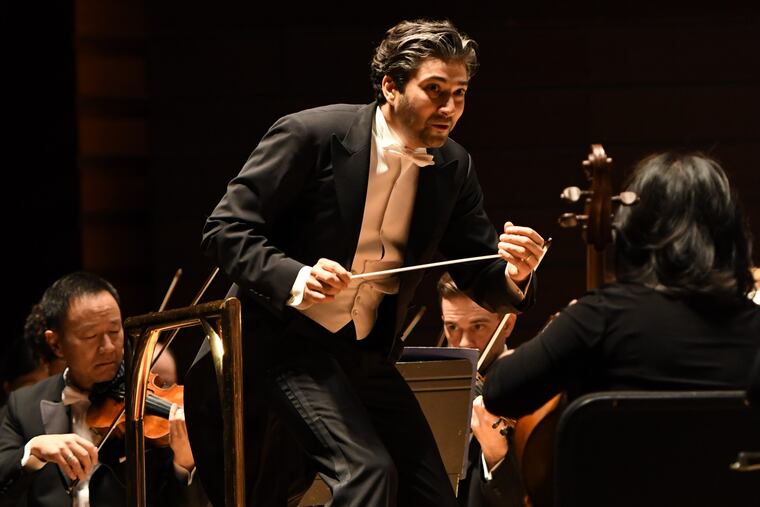In Philadelphia Orchestra debuts, conductor David Afkham and pianist Seong-Jin Cho impress
Both young artists expressed strong opinions in the familiar realm of Beethoven, Mozart, and Brahms.

Overture, concerto, symphony. Once the norm, it's the kind of rote programming formula we're seeing less of at the orchestra these days, but here it was Thursday night in Verizon Hall. And so, absent any programming novelties, the focus fell squarely on matters of pure musical interpretation: What did this guest soloist and conductor have to say?
Which in turn raises the more critical question of who the audience is today. Time was, the listener showing up to Thursday night's Philadelphia Orchestra concert of Beethoven, Mozart, and Brahms would have come equipped with decades of comparative interpretations in her ear. Now, I suspect, the range of listener expertise covers a wide range.
This is hardly an incidental issue. Figuring out who comes to the orchestra and why means nothing less than the orchestra's survival.
But even if conductor David Afkham and pianist Seong-Jin Cho showed nothing radically individualistic, each did leave a personal imprint. Both were making their Philadelphia Orchestra debuts, and the proposition of the program was three works in minor keys, each bearing the mark of Beethoven to some extent.
Beethoven's influence came in the cadenzas to Mozart's Piano Concerto No. 20 in D Minor, K. 466 and the way he underlined the imaginative ways of Cho, the 24-year-old Seoul-born winner of the 2015 XVII International Chopin Piano Competition. Whatever firepower won over that jury, here in Mozart it was the pianist's very present sound combined with a luxurious tone that captivated most. His small improvisatory liberties in the second movement alternated between expressive and puckish and were unerringly smart.
>> READ MORE: Our critics' picks for the season's best concerts, movies, theater, and other entertainment
Were you expecting something stormier from the first movement? Some pianists bring an edge to this piece, one of only two Mozart piano concertos in a minor key, and Cho's rhythmic drive brought in a sense of danger — but never through his tone, which was unfailingly crystalline.
Beethoven opened. Afkham drew a clear distinction between the angry, urgent material and the long line of the sweeter main melody of the Coriolan Overture. What's interesting about this 35-year-old German-born and -trained conductor, though, is that he tends to hear the orchestra as a pianist regards the keyboard — which is to say, subject to instantaneously pliable tempos. Afkham was schooled as a pianist, and you can tell. It's not to say these tempo shifts are capricious. There's an expressive reason behind them — to emphasize the arrival point of the first big orchestral statement of the third movement of the Mozart, for instance.
In Brahms' Symphony No. 1, subtly shadowed by Beethoven, Afkham was often conservative. But then came sections of great freedom. The second movement was one. Taken slightly quicker than is often heard, the music seemed more liberated than usual, like Schumann. It was an approach that seemed to fit Peter Smith, in the principal oboe chair for the piece, as well as clarinetist Ricardo Morales.
The last movement of the Brahms was more fresh than reverent. All three of these pieces are standard repertoire and are deeply ingrained in the muscle memory of orchestral players. That Afkham could put his finely etched opinions into the last movement of the Brahms with the length of notes and subtle phrase shaping suggested a kind of thinking on the podium that might be nice to have around more often.
Additional performances Friday at 2 p.m. and Saturday at 8 p.m. in Verizon Hall, Broad and Spruce Street, $10-$168, 215-893-1999, philorch.org.